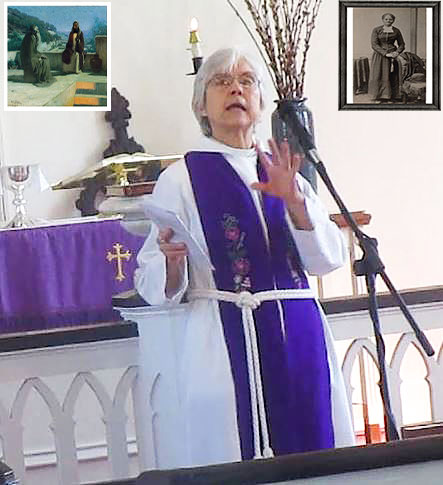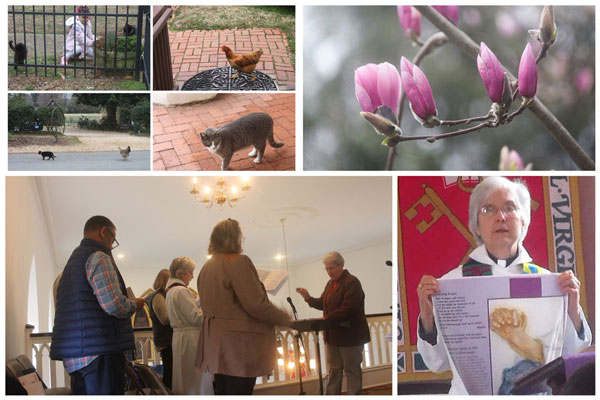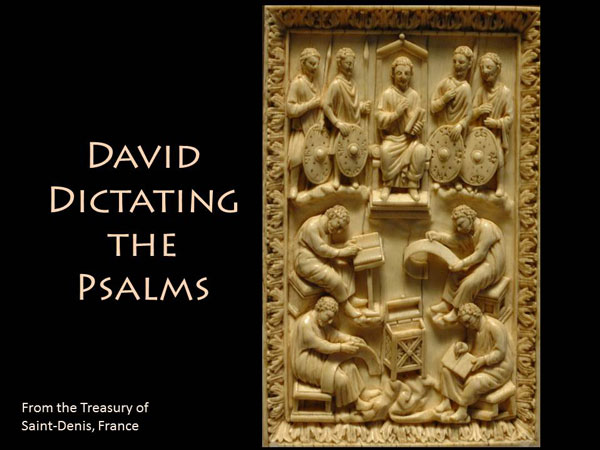
Faith is foundational to our lives as Christians.
In the Living Compass Lenten devotional that some of us are reading during Lent, the readings last week were about faith. Robbin Brent wrote in her entry for Friday, March 3, that faith is believing in something and then acting on that belief.
And she quotes Dr. Martin Luther King, Jr., who says that “faith is taking the first step even when you can’t see the whole stairway.”
We are practical people—we like to see what’s ahead, and plan accordingly so that we can be thoroughly prepared. Planning trips, planning vacations, planning for school, planning for retirement, planning for issues that we may face toward the end of our lives—all of this planning is good to do. But we so often plan as if we are the only ones in charge of our lives and fully in control, forgetting that life is notorious for handing us unexpected and often unwelcome challenges that we have not planned for.
But when these unexpected things happen, we can act on our belief in God by stepping faithfully into whatever the situation is, knowing that God is with us, and will go with us, and will never, ever leave us alone—so we can proceed, yes, often with trepidation, or with caution, or even with great sorrow, but proceed we can and will. We can lay aside our own plans and enter the unknown into which life is calling us.
We can step into the unknown because we are people of faith.
In today’s Old Testament reading, God tells Abram, just a regular person like us, to go from his country and his kindred and his father’s house to the land God will show him. God does not give Abram a map or tell him anything about how to get where God is leading him—that is the future that Abram cannot see.
But Abram believes in God, and so he acts in faith. The writer of Genesis states succinctly, “So Abram went, as the Lord had told him.”
Today’s psalmist is starting out on a difficult journey to Jerusalem, a trip that will be full of unknown challenges, since the traveler must pass through the barren wilderness, exposed to the heat of the day and the chill of the nights, possible attacks by thieves, getting lost, and no telling what else. Wouldn’t it be easier just to stay home?
But the psalmist is willing to set out because that person has faith in God’s steadfast love. The traveler knows that especially in the difficulties of the journey, God, like a mother hen spreading her wings over her chicks to protect them from predators and to keep them warm and safe, will also protect the psalmist in the face of any challenge that may arise.
And then we come to Nicodemus. I really like the story of Nicodemus because he is a practical human being, a literal thinker with a bit of an imagination, a law keeper and a planner, all admirable traits.
It’s that bit of imagination and that need to plan that brings Nicodemus to Jesus at night. After all, he and his fellow rabbis know that Jesus is a teacher who has come from God and that Jesus couldn’t do what he was doing apart from God. Nicodemus just might need to factor Jesus into his life and his plans. So he decides to go have a talk with Jesus to find out.
The first thing that Jesus does is to dismantle the tendency of Nicodemus to think literally, to believe only what he can see and understand. Jesus introduces Nicodemus to the world of imagination—to the life of the Spirit, a life that requires being willing to enter the unknown, because “the Spirit blows where it chooses, and you hear the sound of it, but you do not know where it comes from or where it goes.”
Jesus goes on to tell Nicodemus(and here’s the GOOD NEWS) that God is on the side of the world—all of those who don’t know God, or have any idea of the Spirit—Jesus has come to clue them in, to open them up, to challenge them to go beyond what they can see to what they cannot even imagine, that is, the beginning of life in God, here and now.
Jesus didn’t come to condemn the world but to save the world.
We’ve probably all been where Nicodemus is—we are curious, we can see that God is at work in the world, and we want to know—what do you, God, have to do with my life? We believe in God, but we aren’t sure that we want to act on that belief by letting the Spirit in and possibly wrecking our carefully thought out plans.
We can’t predict or control the Spirit. So how can we plan for the work of the Spirit in our lives? We have to have imagination, to be open to possibilities that may never have occurred to us, to be willing to jettison our carefully laid plans and be willing instead to enter the unknown.
Ultimately we have to choose—we can take a chance and enter into the unknown life of the Spirit, and act on our beliefs, going where God calls us, or just continue on as we are, thank you very much.
Remember, faith is believing in something and acting on that belief. As Robbin Brent says in the essay that I mentioned earlier, “it is our faith in God, expressed through our willingness to act on what we believe, that prepares our minds and hearts to respond compassionately to suffering, our own, others’ and the world’s.”
One person who chose to enter the life of the Spirit was Harriet Tubman. She was born a slave and escaped to freedom. But Harriet could not forget all of the people who were still enslaved back home. So she acted on her belief that “God don’t mean people to own people.” She had compassion on those who were still suffering as slaves. At great risk to her own life, Harriet Tubman kept going back into danger, over and over, even though she had a bounty on her head, to lead many more slaves to freedom.
Quaker abolitionist Thomas Garrett said of Harriet Tubman in 1868 that “I never met a person of any color who had more confidence in the voice of God, as spoken direct to her soul…and her faith in a Supreme Power truly was great.” His statement is on the wall of an exhibit at the Harriet Tubman Underground Railroad State Park in Dorchester County, Maryland.
Many of us know about this intrepid woman because of our friend Cleo Coleman, who embodies Harriet Tubman and tells the story of Harriet’s faith and how she acted on her faith by becoming a liberator of her people. As the History Channel says of Harriet Tubman, “she is one of the most recognized icons in American history and her legacy has inspired countless people from every race and background.”
Harriet Tubman has a new separate feast day on the Calendar of the Episcopal Church, and that day is March the 10th. The Episcopal Church encourages all parishes and dioceses, in conjunction with other communities of faith, to honor Harriet Tubman in a worship service on or near the 110th anniversary of her death, which will be this Friday, March 10, 2023.
So we honor her today as a person who did not hesitate to enter the unknown life that the Spirit called her into, by acting on her faith and responding compassionately to the suffering of others by leading them to freedom. And as Harriet Tubman herself said, “Every great dream begins with a dreamer. You have within you the strength, the patience and the passion to reach for the stars, to change the world.”
After Nicodemus left Jesus late that night and made his way back home, maybe he looked up at the stars and remembered God’s promise to Abraham, that God would make of Abraham a nation as numerous as the stars in the heavens. After all, Nicodemus was a member of that nation of Israel and a teacher. But now, maybe Nicodemus wondered what else Jesus could teach him. Would he ever understand what Jesus was trying to say about being born again, being born from above, being born anew? Maybe Nicodemus wondered if he might dare to follow Jesus openly. Or maybe he was just too tired and too puzzled to give the conversation he had just had with Jesus much more thought right then.
We will never know.
But what we do know is that several months before Jesus was crucified, the chief priests and the Pharisees, of whom Nicodemus was one, wanted to have Jesus arrested. Nicodemus spoke against this arrest. He said, “Our law does not judge people without first giving them a hearing to find out what they are doing, does it?” He was taunted for his statement—the others said, “Surely you are not also from Galilee, are you?” So now we know that Nicodemus must have given more thought to what Jesus had said to him, for Nicodemus is acting on his belief that Jesus has come from God by having compassion on Jesus and speaking against his arrest.
After Jesus is crucified and dies, Joseph of Arimathea, a secret disciple of Jesus, asks Pilate for the body so that he can give Jesus a proper burial. Nicodemus goes with Joseph of Arimathea to bury Jesus, and brings with him a mixture of myrrh and aloes, weighing about a hundred pounds. The weight of these spices would be appropriate for the burial of a king. Clearly, Nicodemus revered Jesus and had compassion for him, or he would not have honored him so lavishly.
We hear nothing more of Nicodemus and we can only imagine the rest of his story. Did his compassion for Jesus become compassion for the world around him?
We don’t know the rest of our stories either. We can’t know the future. But what we do know is that God loves us with a steadfast love. And that steadfast love never ceases. God’s love will carry us through all our goings and comings in this life, through all the joys and all the heartaches, because we know that God’s mercies will never come to an end. Even after our longest and darkest nights, God’s mercies are new every morning. We can proceed through the unknowns ahead with confidence.
And we can faithfully act on our belief in our steadfast, merciful and loving God by letting the Spirit blow where it will through our lives. We can faithfully step into the unknown, and go where God would send us, full of steadfast love and compassion for all this hurting world.













 “Nic drove a large black Escalade. He loved the way the Escalade roared to life when he turned the key in the ignition, the way he sat up high above the rest of the traffic, barely having to press the accelerator to gun past anyone in his way and to get to his destination in record time.The Escalade suited Nic, summed up who he was, really.Big, bold, in charge.”
“Nic drove a large black Escalade. He loved the way the Escalade roared to life when he turned the key in the ignition, the way he sat up high above the rest of the traffic, barely having to press the accelerator to gun past anyone in his way and to get to his destination in record time.The Escalade suited Nic, summed up who he was, really.Big, bold, in charge.”